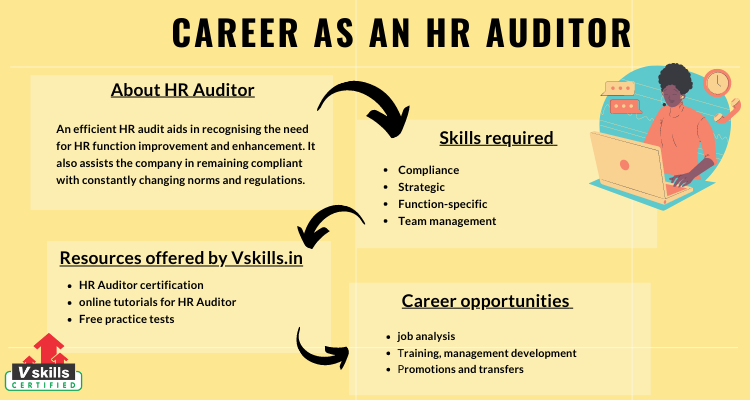An efficient HR audit aids in recognising the need for HR function improvement and enhancement. It also assists the company in remaining compliant with constantly changing norms and regulations.
Let us dive deeper into Career as HR Auditor!
Who is an HR Auditor?
An HR audit is a way for a company to assess its current situation and determine what needs to be done to improve its human resources function. It entails going over all parts of human resources in a systematic, checklist-like manner to ensure that government legislation and company policies are followed.
Job analysis, job description, job design, records of recruitment and selection, orientation and placement, training and development, job evaluation, performance appraisal, motivation and morale, compensation packages, welfare and social security, and industrial disputes and their resolution are all examples of human resource (HR) audits.
Role of HR Audit Professional
HR Audit professionals recognize the strengths and identify any needs for improvement in the human resources function. Some of the tasks performed by HR Audit Professionals include:
- HR Audit Professionals ensuring the effective utilization of the organization’s human resources.
- They review the compliance in relation to the administration of the organization as well as provide a sense of confidence in management and the human resources function.
- They maintain the organization and the department’s reputation in the community and establish a baseline for future improvement for the function.
Types of HR audits
There are two approaches to conduct an HR audit:
Internal audit: Internal auditing is when an audit is conducted by a company employee. The internal person will need to be taught, and he may be given a list of questions to ask the people who can provide answers.
External audit: When an audit is undertaken by outside professionals or consultants who are not employees of the organisation, it is referred to as external audit. It is generally recommended that the audit be undertaken by an outside party who can objectively assess the performance and openly support corrective efforts.
What to expect ?
A comprehensive audit is a time-consuming and intensely focused process that may necessitate the evaluation of a large number of documents and rules, as well as the solicitation of feedback from HR personnel, selected employees, and managers from other departments. The amount of time and effort necessary are determined by the size and type of business, the type of information sought, the scope of the audit, and the number of individuals on the audit team.
In comparison to a best-operations audit, which compares one specific practise to another employer’s approach, or a function-specific audit, which examines only one major element of the employer’s HR practises, a full-scale legal compliance audit covers a lot of ground and takes a long time to complete.
Scope
Career in Human resource auditing has a broad reach. It symbolises a comprehensive approach. It is assumed that human resource management entails much more than the process of finding, hiring, retaining, and terminating personnel. In other words, human resource audit is interested in all employee-related programmes, regardless of their source.
Recruitment, selection, job analysis, training, management development, promotions and transfers, labour relations, morale development, employee benefits, pay and salary administration, collective bargaining, industrial relations, and communication are all aspects covered by an HR audit in this fashion. In addition, areas such as leadership, grievances, performance appraisal, and employee mobility are included in the scope of human resource audit.
HRD audit now includes all areas such as review and integration of corporate mission, goals, policies, and objectives, manpower planning, career planning and development, and transfer policies, performance appraisal systems, training development functions, recruitment and selection, and so on, for integrating personnel management with HRD functions.
Average Salary – HR Auditor
In India, the average monthly compensation for a Ciel HR Auditor is around 17,324, which is about 12% less than the national average. Human resource auditors are still in high demand. According to Randstad’s 2020 Salary Guide, there were over 160,000 job announcements for HR auditors in the past 12 months. Many HR auditors have chosen to specialise as a result of the development in HR automation, according to the research, restricting the pool of generalist candidates and raising demand.
Resources for HR Auditor
Before you can become an expert in desired areas, you must first build a solid base. Before you can move on to practical teaching, you’ll need to have the right applied skills. To gain a full understanding of the domain, you can use the following tools:
- Firstly, Online Tutorials for HR Auditor
- MBA in HR Auditor
- Also, Certification Courses from verified sources such as Vskills, Coursera, Udemy and so on.
- In addition, Online communities
- Moreover, Blogs and study material from experts in this field and many more.
Here are some examples of how you can improve your abilities:
- Freelancing
- Internships
- Apprenticeship programs
The above steps will help you to get this domain started. It’s a long way to go, however. You can take an advanced course to reach a new level of skills.
Some resources offered by Vskills
Vskills offer HR Auditor certification for all those interested in working in this field. This certification course covers the following topics –
- HR Audit Basics
- HR Audit Dimensions
- HR Audit Methods
- Audit of HR Systems
- Audit of HR Strategies
- Audit of HR Competencies
- Audit of HR Culture and Values
- HR Impact and Alignment
Vskills also offers free practice tests and online tutorials to supplement the learning process. You can check them by clicking on the following links –
Discover the career opportunities and other prospects of career as HR Auditor. Hurry up and start preparing now with Vskills.in!




